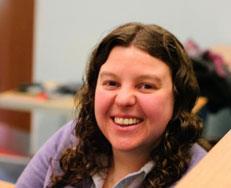Lynne discusses how working with large pieces of equipment and computer programs helps her discover something new every day
What is a research fellow?
A research fellow is a research position within a university of similar academic-based institution. The role generally follows on from having studied for a PhD (a doctorate).
What do you do in your job?
Even though I am a chemist I am not a laboratory chemist, I don’t spend much time in a lab with a lab coat on etc. I spend a lot of my time working with big pieces of equipment or at a computer. We are interested more in the properties of what we make and studying them in-depth. The work I do revolves around doing research into the chemistry of solid materials. In our laboratory we work with crystals of different compounds because crystals are very special in the way they interact with x-rays and produce patterns specific to their arrangement of atoms and molecules within them. We do this by using pieces of equipment called diffractometers which provides information on the structure of a material. By looking at this information we can work out the three-dimensional shape of atoms and molecules and determine how they pack together in a crystal. By understanding these properties we can modify different compounds. For example, if we take pharmaceutical materials (e.g. paracetamol) and study their crystal structure we can modify their properties and change how well they dissolve in the bloodstream. Another piece of equipment I used is hot stage microscopy which enables us to watch and visually monitor how a crystal changes when you heat it up or cool it down. This is useful for developing products likes pigments to be used as dyes or sensors which change colour when the temperature changes for example colour changing mugs or baby spoons.

What do you enjoy most about your job?
I’m very lucky as every day I get to discover something new that nobody else has ever seen before. And we often do experiments where we don’t know what the answer is going to be so it can be quite exciting. I do a lot of outreach activities as part of my job for example helping to organise events at the Big Bang Fair or going into schools to talk with students. Talking to the general public about science is really rewarding but you can be asked absolutely anything so it keeps you on your toes!
What attracted you to becoming a research fellow?
I have always really enjoyed science but I don’t think I really planned my way into my current job. I ended up working in the area that I am in because during my undergraduate degree I spend a year working in industry and I enjoyed it so much. My industrial placement was spent working at the ISIS neutron facility in Oxfordshire. I enjoyed the work but I decided I didn’t want to be based at the facility as due to the nature of the experiments we ran there was always the chance of getting called out in the middle of the night! Whilst I studied for my PhD (postgraduate doctorate) I found that I was really good at research in my area and I’m lucky because there is a lot of freedom in what I do. So I chose to continue along this path because it’s fun and every day is different.
How did you get into your job?
After taking A-levels in chemistry, physics, mathematics and further mathematics I knew I wanted to study science at university and I liked both chemistry and physics so when I found a course in chemical physics at the University of Edinburgh, it meant I didn’t have to choose! During my degree, I was able to do an industrial placement year which enabled me to gain experience in the work I do now. After graduating I did a PhD in chemistry at the University of Cambridge which was based for a large part at the ISIS neutron facility where I spent my industrial placement. Following this, I took up a postdoctoral research position in the school of chemistry at the University of Glasgow where I spent 4 years before moving to the department of chemistry at the University of Bath where I am currently based.
What are the opportunities for career progression?
I’m currently working on a contract basis, so the next step would be a full academic position. These can be quite competitive to get, but there is good progression from there. It is very competitive to get funding too, so you have to be prepared for setbacks, but I’m told that persistence is the key!
What advice would you give for people wishing to enter your career area?
Find an area that really interests you and gets you excited. You have to be prepared to work hard, be very persistent and not give up when you have setbacks!
First published 2015













